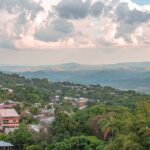At last year’s 28th meeting of the Conference of the Parties to the United Nations Framework Convention on Climate Change (COP28), global leaders came together to address the gravest problems facing humanity today: climate change, environmental degradation, and food system dysfunction. Agriculture contributes significantly to pollution and poor land-use practices, accounting for about one-third of greenhouse gas emissions globally. However, food systems can also play a critical role in the fight against climate change.
By adopting land management approaches that recognize the interconnectedness and complexity of landscapes, communities can transform their food systems to mitigate emissions, adapt to climate pressures, promote human rights and food sovereignty, and protect ecosystems and biodiversity. Reflecting the importance of these goals, 159 countries formally signed the COP28 UAE Declaration on Sustainable Agriculture, Resilient Food Systems, and Climate Action.
At COP28, 1000 Landscapes for 1 Billion People (1000L) launched a collaboration with Regen10, a coalition of 13 organizations focused on promoting regenerative practices to transform the global food system into one that is more sustainable, efficient, and both climate- and nature-positive. Together, they published a joint brief, “Landscape Collaboration for Regenerative Food Systems: Towards an Action Agenda,” to spur action to transform food systems.
The paper highlights the value of meaningful collaboration at the landscape level for food systems transformation. New approaches such as agroecology production principles, dialogues to build shared understanding, and landscape partnerships can be bundled through collaborative landscape action as effective catalysts for change. Forming landscape partnerships, in particular, enables people to overcome common obstacles to achieving regenerative frameworks. By banding together, building healthier food systems, and enacting more streamlined management of complex risks and costs, landscape actors can overcome barriers via collaboration and innovation.
The brief contains the following five key recommendations for implementing these approaches:
- Developing strong landscape partnerships that include food system stakeholders.
- Investing in ecological restoration and natural infrastructure.
- Mobilizing regional policy, business, and finance innovations.
- Designing effective and nuanced success metrics.
- Participating in deeper dialogue, analysis, and reflection.
“As we navigate our collective journey toward a more resilient, regenerative, and sustainable global food system, this brief offers insight into the forms of cooperation needed,” said Louise Buck, senior advisor at EcoAgriculture Partners. “Through this piece, we hope to raise global awareness of the power of landscape collaboration and ways to catalyze and support it. As systems influencers come to recognize the potential of integrated landscape approaches to food system transformation, we anticipate that meaningful investment in regenerative landscapes will lead food systems to become more sustainable, efficient, and just.”
The brief is the first output of a new partnership between 1000L and Regen10. Through this partnership, 1000L aims to strengthen landscape partnerships by leveraging Regen10’s resources, expertise, and networks to bolster regenerative practices at the farm level. The brief is the first step of this collaboration, as it highlights the importance of landscape approaches to food-system transformation.
“We’re delighted to be working with 1000L to develop tools and guidance that will help landscape initiatives connect and collaborate on food systems’ transformation,” said Tara Shyam, director of Regen10. “Over the past year, we have engaged in numerous landscape initiatives that are already working to create climate- and people-positive food systems that deliver regenerative outcomes, but much of this work is taking place independently. To scale up sustainable food systems, we need initiatives and actors across landscapes and throughout supply chains to connect with one another—and that is what this partnership aims to help achieve.”
The partnership between 1000L and Regen10 is a reminder of the importance of collaboration in addressing food system dysfunction and the climate crisis. Food-system transformation is a vital component of the well-being of people, the planet, and nature, putting it at the forefront of climate action. By working together, it is possible to integrate unique sets of skills and priorities into cohesive action that transforms food systems so they promote human rights and food sovereignty while also fighting climate change and environmental degradation.


